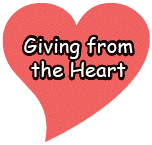 LCH Stewardship 2007—Temple Talk by Bob Tellander
LCH Stewardship 2007—Temple Talk by Bob Tellander
Why do we make a metaphor out of our necessary activities and responsibilities when they clearly conflict with our economic interests?
We do not work to earn money in order to give it away. We want to keep it and get the most from our hard earned bucks. To yield on this point, we have to be seduced by words that express our values well enough to extort some extra cash from us. Thus, “giving from the heart” implies that we will use our emotions to justify our gifts to benefit anyone who is in greater need than we are. That’s why you get all those pictures in the mail of helpless kids with physical deformities and with the blank stare of hunger scratched across their faces from charities that want your emotionally pliable dollars. We, thus, suspend logic, move to our emotions and select the need that most touches us.
This may work to raise the amount needed by a charity, but it does not extend the quality of our lives—unless you believe such responses reduce your guilt AND absolve you above all others from further giving. You feel good in your heart, but the major beneficiary of your giving is yourself. A “We Gave” placard hangs in your mind as you focus on other more pressing concerns. Such word play, metaphors, and emotional validation for actions produce myths, not meaningful response to life as it is. Giving is not expiation.
As Christians, the challenge relates to a more abundant life and we are included as beneficiaries in that. Giving from the Heart means your chief organ—the heart—that sustains you, remains part of the gift. In short, you do not give to get away but to get involved in the lives of others such that both your and their lives are improved. When the rich man was told, “Sell all that you have and follow me.” he was NOT told that self-impoverishment makes anyone a better person. He was told “How would you make your life more meaningful, if you were not rich?” His physical response was “I do not know. But in ignorance, I prefer to remain rich.” And he went away with a heavy heart.
What then creates a more abundant life? Jesus, the iconoclastic Messiah, informs us that we should embrace all creation because, “Whatever you do to the least of these [creations], you do to God, the Father.” In this simple transitive sentence, Jesus reinterprets the laws of Moses and made it humanly possible to be Jewish, Christian, or Muslim. All you have to do is express your love of God through your relationships with others.
You do not have to be rich to achieve this. In fact, being rich confuses us into thinking that we can buy our relationships with others. We can purchase specific kinds of behavior, but do you love your employers because they pay your salary? Does God love you more because of the size of the donation you place in the collection plate? (A widow mite? Pun intended, word play again.) What about giving makes it divinely meaningful?
We enrich our lives and the lives of those in need through the quality of our relationships with them. Not just the size of our financial donation.
In demonstrating what “Peace” would look like in a Muslim context, I asked all those who attend Friday prayers at the mosque to pray out loud when they said their petitioning prayers. All those who heard these prayers were committed to respond to them. Given their limits, all should, nonetheless , participate with the person in need to resolve their problems. (So much for a relaxing afternoon on the Sabbath Day.)
As covenanted people of faith, Christians and Jews too could do the same thing within their congregations and communities. Note: This starts the process at “home,” among people whom you likely know and/or accept. The experience and models developed by engaging in such a more abundant life, can and will be used to help others in need living in your neighborhood, and they, in turn, could do the same until everyone is connected.
Some day, we may even visit strangers in prison, the sick in hospitals, the neglected in our schools, the homeless in our gutters, the addicted in our parks. When you do, you will have a much better awareness of your relationship to God and an awareness of the abundance of life that envelopes you.
Give of yourself and help all those in need. Do not settle for less.
1730 Punahou Street, Honolulu, HI 96822 • 808-941-2566
Comments welcome at webmaster@lchwelcome.org